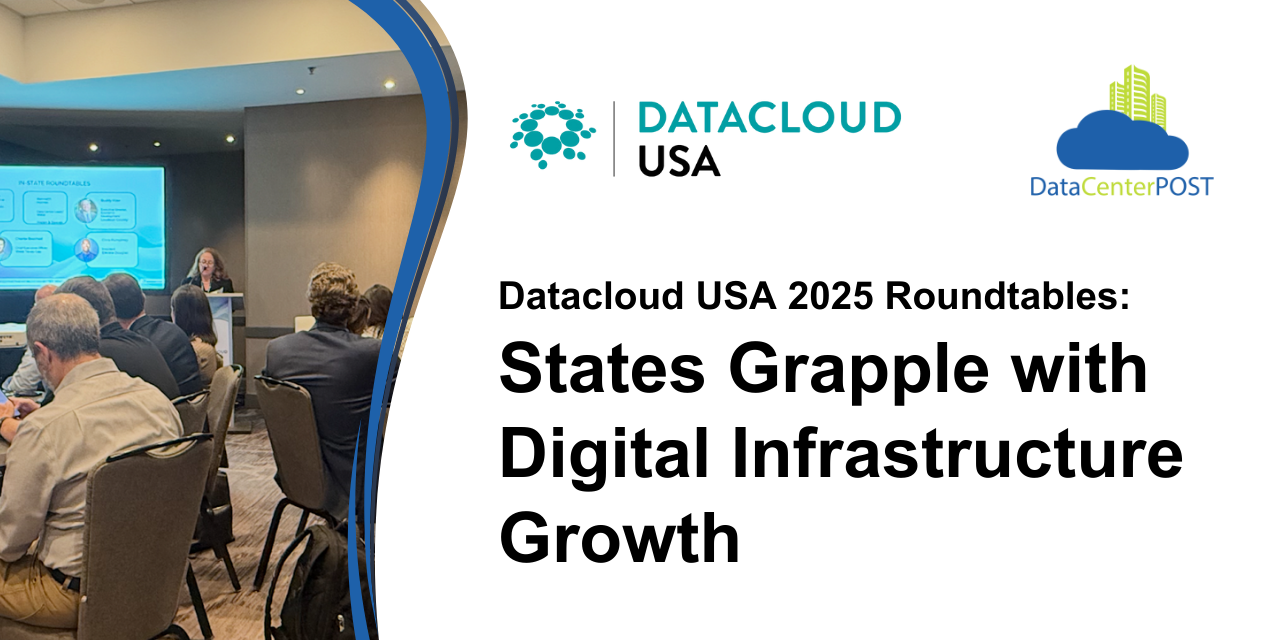At the Datacloud USA event in Austin, Texas, leaders from across the digital infrastructure ecosystem gathered to tackle one of the industry’s most pressing challenges: aligning data center development with community needs, state priorities, and long-term infrastructure planning. Hosted in the Datacloud Engage room, the in-state focus roundtables brought together regulators, operators, energy providers, and community representatives to discuss opportunities, risks, and lessons learned across key markets including Virginia, Georgia, Texas, with Water a specialty topic included.
Moderated by Ilissa Miller, CEO of iMiller Public Relations, who is also an Advisor to the Nomad Futurist Foundation, and Board Member of the OIX Association, the session built on her work as Chair of the OIX Digital Infrastructure Framework Committee. Miller framed the discussion by underscoring the parallels between digital infrastructure today and the historical development of municipal water systems over 150 years ago. Both services essential, yet digital infrastructure – at its infancy – is often overlooked in community master planning.
Virginia: Shifting Perceptions in a Mature Market
Buddy Rizer, Executive Director of Economic Development for Loudoun County, highlighted how community perception has shifted even in one of the most established data center markets. Loudoun transformed from a struggling economy into one of the strongest in the U.S., generating a billion dollars annually and lowering tax rates. Yet, Rizer noted, the narrative can no longer center solely on tax benefits. Instead, power infrastructure and community pushback now dominate the conversation. With citizens rallying in opposition and environmental concerns mounting, Virginia faces the need to reframe messaging around data centers as critical infrastructure essential to economic resilience and everyday life
Georgia: Balancing Hyperscalers and Co-Location Providers
Chris Pumphrey, President of the Elevate Douglas Economic Partnership, emphasized the importance of articulating both quantitative and qualitative benefits of data centers to communities. He noted that every community’s priorities differ, making localized engagement essential. In Georgia, a major challenge lies in the regulatory framework: while the Public Service Commission governs Georgia Power, other utilities operate outside that oversight. Up-front funding requirements often squeeze out co-location providers, potentially impacting hyperscalers themselves. The discussion underscored the need to balance utility regulations with industry realities to ensure growth benefits all stakeholders
Texas: A Gold Rush Strains Local Capacity
Charlie Beecherl of WTG (West Texas Gas) reported that Texas is experiencing a “gold rush” of proposed developments, with as many as five sites in a single county. While the state’s business-friendly environment attracts investment, it also strains regulatory agencies and local communities. Participants debated how to discern “real” projects from speculative ones, the need for clearer communication with adjacent vendors such as fiber providers, and how to prepare for massive energy demands. Despite challenges, Texas remains well-positioned thanks to its role as an energy powerhouse and leader in renewables, with traditional energy players now stepping into the digital infrastructure space
Communities and Education
Kenneth Horner of Hazen and Sawyer, broadened the lens to infrastructure challenges that transcend state borders based on his experience as a water expert and consultant to municipalities and hyperscalers alike. He identified two main themes: the lack of communication between stakeholder groups and the urgent need for education. In many communities, decision-makers still have limited understanding of what data centers are or how they operate. Coordination across utilities, from fiber to water to power, is also underdeveloped, often leading to inefficiencies. Horner cited examples of cross-infrastructure working groups in Seattle and Washington, D.C., as models for reducing conflict and streamlining development. He also stressed that demand is not slowing in states like California and Virginia, reinforcing the need for more sophisticated, connected planning
Key Takeaways
The roundtables revealed common threads across states:
- Community Engagement is Critical: Data center narratives must evolve beyond tax revenue to emphasize their role as vital infrastructure.
- Regulatory Frameworks Matter: Utility regulations and funding models can either foster growth or unintentionally sideline key players.
- Speculation vs. Reality: States like Texas must find ways to filter viable projects from speculative proposals.
- Cross-Sector Collaboration: Coordinated planning between utilities and agencies can ease friction and reduce inefficiencies.
- Education and Empowerment: Many local leaders lack a clear understanding of digital infrastructure. Empowering them with knowledge helps shift the conversation from resistance to informed decision-making.
Looking Ahead
As Miller reminded attendees, communities are not rejecting digital infrastructure out of malice but often out of misunderstanding. The work of the OIX Digital Infrastructure Framework Committee aims to bridge this gap, equipping municipalities with the tools to assess what they have, what they need, and what they want for the future. By reframing the dialogue as one of empowerment rather than disruption, industry leaders and communities alike can become true partners in shaping the digital foundation of the Age of Intelligence
If you missed Datacloud USA then 2026 should be on your radar. Excellent discussions and takeaways resonated through all of the sessions, exhibit floor and table top meetings.
For information about the OIX Digital Infrastructure Framework, you can email difc@oix.org and visit www.oix.org.


